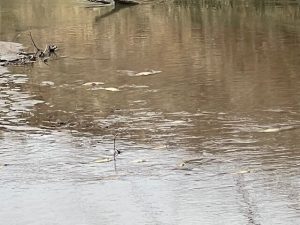Nishnabotna Water Defenders to meet, discuss fertilizer spill settlement
August 5th, 2025 by Ric Hanson
(Radio Iowa) – A group called the Nishnabotna Water Defenders will meet Sunday in Red Oak to review the recent settlement for last year’s fertilizer spill at Red Oak co-op that killed hundreds of thousands of fish. Last week, Iowa’s attorney general announced NEW Cooperative in Red Oak has agreed to pay a 50-thousand dollar penalty to settle the case, plus another 50-thousand dollars will go to environmental conservation efforts in Montgomery County.
Nishnabotna Water Defenders co-chair Terry Langen says that’s woefully inadequate given the spill’s impact on the river.”The DNR’s initial findings were close to a million fish that were killed, not to include frogs, mussels, snakes that they visibly saw dead and floating at that time,” he says, “but then continued to die.” Iowa officials say over 750-thousand fish died along a 50-mile stretch of river and Missouri officials say along 10 miles of the river in their state nearly every fish was killed.

March, 2024 fish kill on Nishnabotna River (Photo by Mike Peterson, Shenandoah)
The spill happened in March of last year when a valve on a fertilizer tank was inadvertently left open for two days. An estimated 265-thousand gallons of liquid nitrogen flowed through a drainage ditch into the East Nishnabotna River. Langen says it does not appear the settlement requires the 50-thousand dollars worth of conservation measures be focused on the river. “That is a payment to the Montgomery County Conservation Board to be used for projects including habitat and prairie restoration, controlled burn equipment purchases, habitat management, and native tree planting — so none of that is even outlined into the order to have to go to the Nishnabotna River at all,” Langen says.
“That’s up to the Montgomery County Conservation Board’s discretion on where those monies will be spent.” Nishnabotna Water Defenders Secretary Jodi Reese says the settlement lacks safeguards for the river’s future. “No mention of monitoring, anything like that in the future which really concerns our group which was really formed to speak for the water and the people who use the water,” Reece says, “which is actually all of us.”
Shortly after the spill last year, NEW Cooperative officials announced they’d been working with the state officials to speed up a response to the spill, including building a series of dams and excavating a considerable amount of soil from the creek that goes into the river to prevent further contamination.




